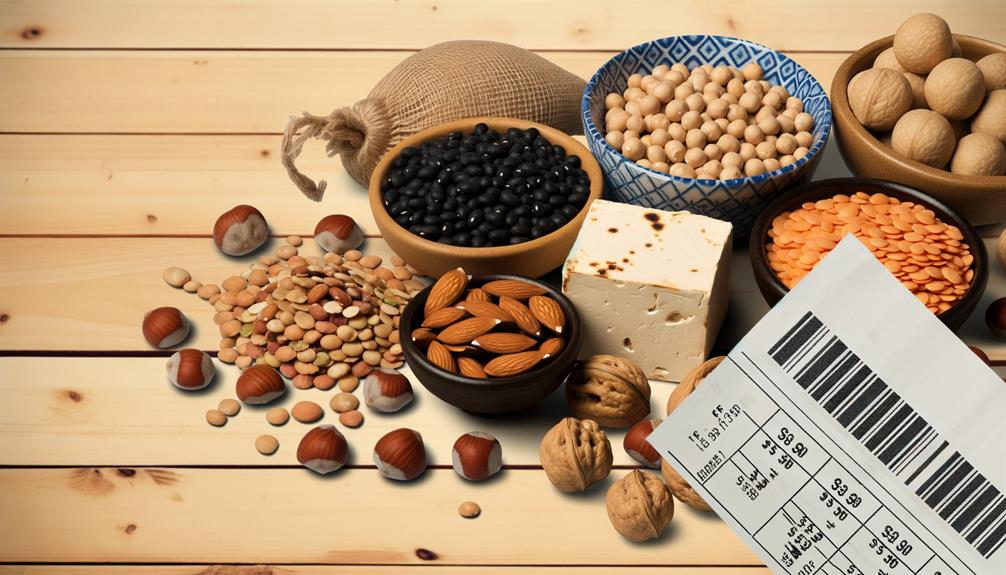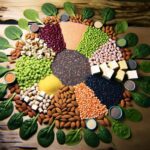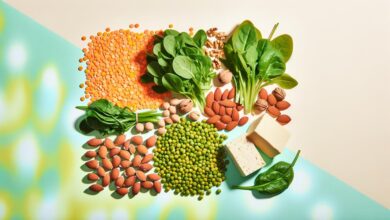As you meander through the maze of modern nutrition, you might marvel at the myriad of budget-friendly plant-based proteins that promise both a wealth of wellness and a relief for your wallet. You've no doubt heard the buzz about legumes, those nutritional powerhouses that punch well above their weight in terms of protein content and cost-effectiveness. Whole grains, too, serve as affordable staples that don't skimp on sustenance. You're likely curious about how soy products can offer versatility for pennies, and how seeds and nuts, though small, are mighty in their protein provision. Even green vegetables have a surprising role to play in your protein repertoire. As you seek to support your health without straining your finances, let's explore these protein heroes of the plant-based world together, uncovering how they can fit into your cultural cuisine and lifestyle, and why they might just revolutionize your approach to eating well on a budget.
Key Takeaways
- Legumes and whole grains are affordable and nutritious protein alternatives with a diverse array of varieties.
- Soy products like tofu, tempeh, and edamame offer versatile and affordable options for plant-based protein.
- Seeds and nuts are compact snacks packed with protein and can be paired with grains or legumes for a complete protein profile.
- Green vegetables like spinach, kale, and broccoli not only provide protein but also other vital nutrients, and can be incorporated into various dishes for a balanced and nutrient-rich diet.
Legumes: Nutrition and Cost
Legumes, encompassing beans, lentils, and peas, offer a powerhouse of nutrition and an affordable protein alternative that's gaining popularity in health-conscious circles. You'll find a diverse array of legume varieties, each boasting its unique profile of vitamins, minerals, and fiber. Whether you're crafting a meal for loved ones or guiding clients toward healthier choices, these plant-based gems are versatile and universally cherished.
Cooking legumes can seem daunting, but it's simpler than you might think. Begin by choosing quality legumes, looking for options that are culturally authentic and resonate with the culinary traditions you're embracing. Soaking beans reduces cooking time and improves digestibility, making them a practical choice even for busy weeknights. Lentils cook quickly and require no soaking, offering a convenient boost of nutrients to any dish.
Whole Grains: Affordable Staples
Just as legumes are a nutritious and economical choice, whole grains also serve as a cost-effective foundation for a well-rounded diet, offering essential nutrients and energy to support your daily activities. Grains like brown rice, quinoa, and oats are rich in fiber and plant-based protein, making them staples in many cultural cuisines while promoting heart health and digestion.
When you're looking to extend your budget and nourish others, understanding grain storage tips is crucial. Store your grains in airtight containers in a cool, dry place to maintain their freshness and prevent spoilage. This way, you can buy in bulk, reduce waste, and always have a robust grain option on hand.
Mastering a few cooking techniques will also elevate your grain dishes, ensuring you're serving meals that are both delicious and nutritious. For instance, toasting grains before cooking can enhance their nutty flavor, while soaking them can shorten cooking times and improve digestibility.
Soy Products: Versatility on a Dime
Exploring the world of soy products, you'll find an array of versatile and affordable options that cater to health-conscious diets and diverse culinary traditions. Soy versatility shines in the humble yet mighty tofu, which, with its neutral flavor and sponge-like texture, absorbs the essence of any spices, herbs, or marinades you introduce. It's a blank canvas waiting for your creative tofu recipes to come to life, whether you're serving a spicy stir-fry or a soothing soup.
Rich in protein and low in cost, tofu is just one of the soy-based champions in your quest for nutritious and budget-friendly meals. Don't overlook tempeh, an often-underrated soy product that offers a firmer texture and nuttier flavor. It's perfect for grilling or adding a hearty bite to salads and sandwiches. Soy versatility doesn't stop there; edamame, the tender young soybeans, make for a delightful snack or side dish, loaded with fiber and essential vitamins.
You're not just nourishing your body with these soy wonders; you're also embracing sustainability and supporting dietary choices that benefit the planet. So, as you craft meals that are both healthful and helpful, remember that soy products are your allies in serving up well-being on a budget.
Seeds and Nuts: Snack-Sized Protein
Dive into the nutrient-rich world of seeds and nuts, where compact snacks pack a powerful protein punch ideal for your health-driven lifestyle. These tiny but mighty morsels are not only delicious but also embody the essence of cultural relevance and sustainability. Whether you're crafting a meal for friends or seeking to enhance your own nutrient intake, seeds and nuts are versatile allies.
- Protein Pairing
- Combine with grains or legumes for a complete protein profile.
- Enhance salads with a handful of sunflower seeds or sliced almonds for a satisfying crunch and protein boost.
- Mix into smoothies or oatmeal to elevate your breakfast's protein content.
- Seed Varieties
- Chia seeds: A sprinkle can transform your dishes with omega-3 fatty acids and fiber.
- Hemp seeds: Offer a complete protein source, containing all nine essential amino acids.
- Pumpkin seeds: High in protein and rich in magnesium, supporting heart health.
- Nuts for Nutrition
- Almonds: Packed with protein, fiber, and heart-healthy fats.
- Walnuts: Brain-boosting omega-3s in a convenient, snackable form.
- Cashews: Lower in fat than most nuts and a good iron source, perfect for serving others nutrient-dense options.
Incorporating these into your diet isn't just a health-conscious decision; it's a step towards nurturing both yourself and those you care for.
Green Veggies: Unexpected Protein Heroes
While seeds and nuts offer a compact protein source, don't overlook the protein power hidden in green vegetables, essential for a balanced, nutrient-rich diet. You might not think of your leafy greens as protein heroes, but they're more than just fiber and vitamins. Consider the protein density of spinach, kale, and broccoli – these green veggies pack a significant punch in a small package. They're perfect for when you're aiming to nourish your body and support those around you with meals that are both wholesome and satisfying.
Incorporating a variety of green vegetables into your diet ensures that you're not only getting protein but also a wealth of other nutrients that are vital for health and well-being. When it comes to maximizing the protein content, cooking methods matter. Lightly steaming or sautéing can help retain more of the protein, as well as other nutrients, compared to boiling. And if you're serving others, these methods also preserve the vibrant colors and textures that make green vegetables so appealing on the plate.
Frequently Asked Questions
How Can I Ensure I'm Getting a Complete Protein Profile With a Plant-Based Diet?
You can achieve a complete protein profile by practicing protein complementarity—pairing foods like beans and rice that together provide all essential amino acids, balancing your diet to serve your body's needs.
Are There Any Budget-Friendly Plant-Based Protein Sources That Are Also Low in Carbohydrates for Those Following a Keto Diet?
Absolutely, you can opt for keto-friendly tofu and spirulina supplementation—both are low-carb, wallet-friendly, and pack a nutritious punch, perfect for serving your body's needs while adhering to your dietary preferences.
Can You Recommend Plant-Based Protein Options for Those With Allergies to Legumes or Nuts?
You're in luck! Dive into the ocean of seed proteins like hemp or chia, and explore grain options such as quinoa. They're allergy-friendly, brimming with nutrients, and perfect for nourishing those around you.
How Does the Protein Quality of Plant-Based Sources Compare to Animal-Based Proteins?
Plant-based proteins often have a lower Protein Digestibility-Corrected Amino Acid Score than animal sources, but they can still support your health and help you serve others with nutritious, conscientious meal choices.
What Are Some Creative Ways to Incorporate These Budget-Friendly Plant-Based Proteins Into Meals for Picky Eaters or Children?
Spice up mealtime with playful games, sneakily blending lentils into sauces, or make protein popsicles with nut butter. You'll nourish while they relish, turning picky eaters into plant-protein fans, one bite at a time.







